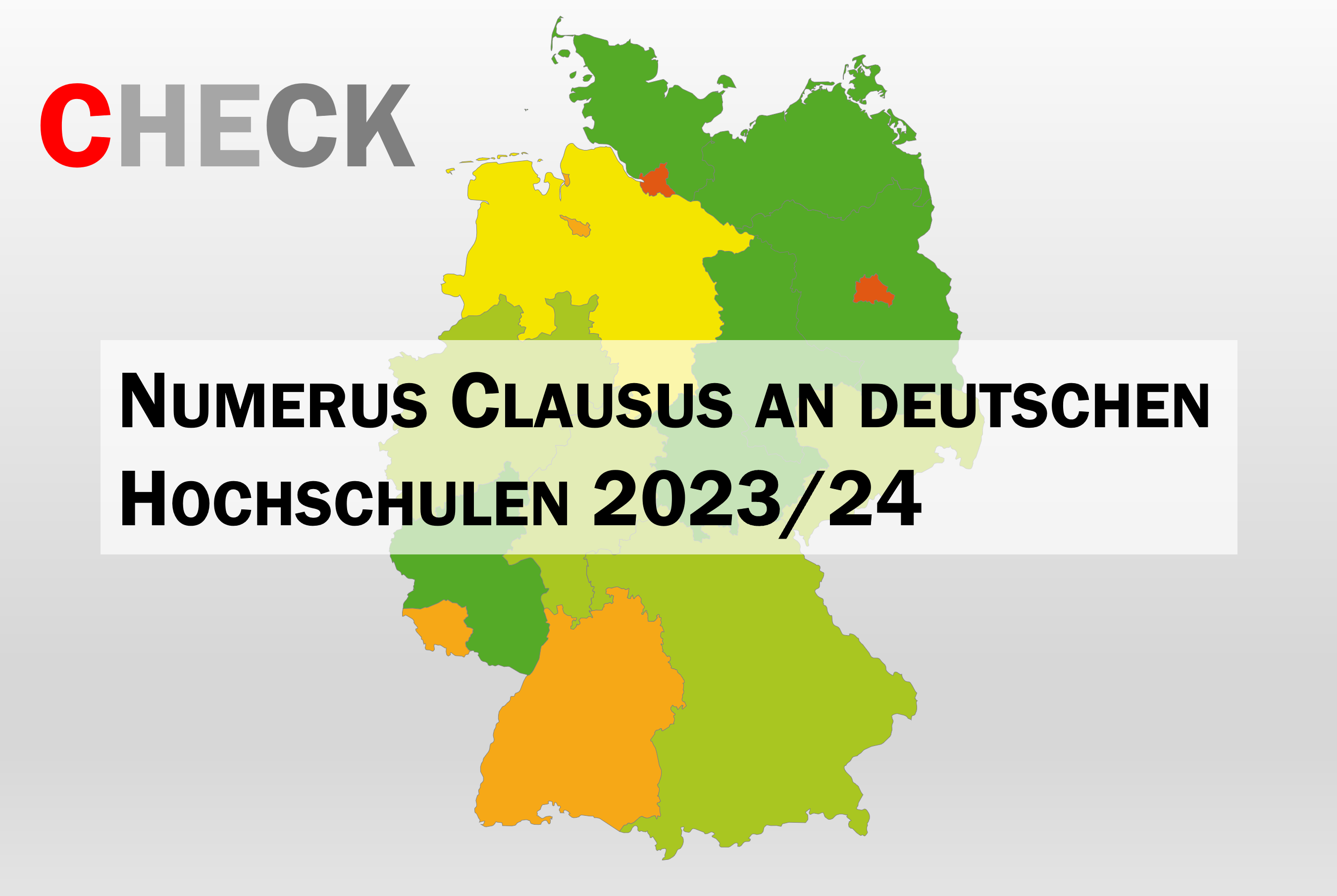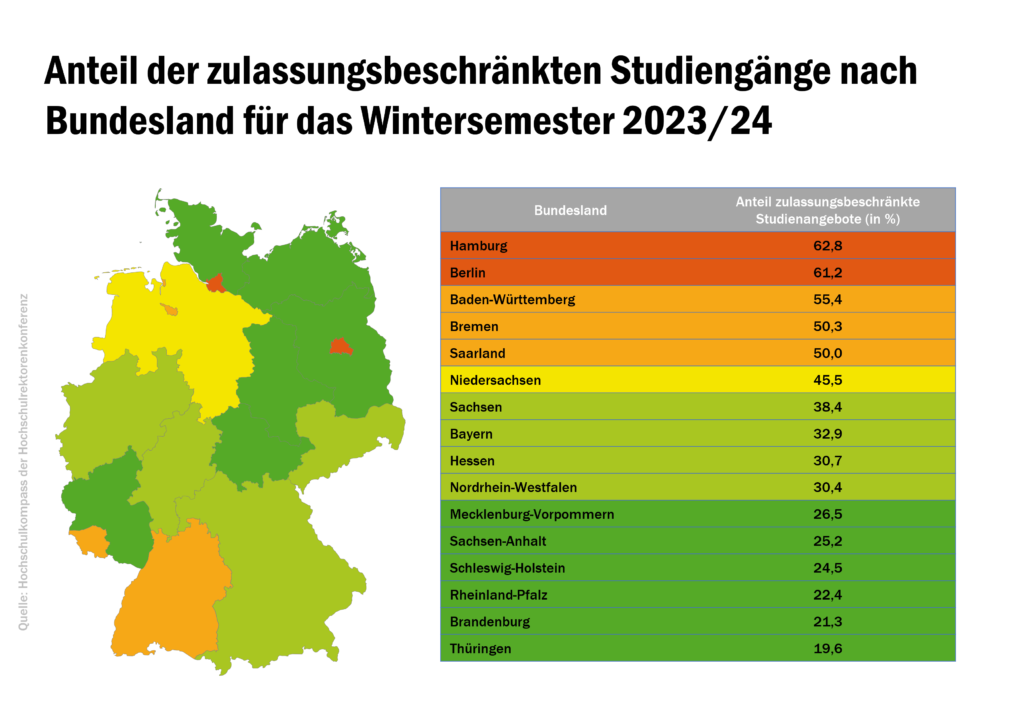
Those planning to start university in Germany this winter semester have a good chance of being offered a place. Only about 38 per cent of all degree programmes in Germany have restricted admissions, referred to as numerus clausus (NC), or involve aptitude tests or selection procedures that do not set a maximum number of students to be admitted. Hamburg, Berlin and Baden-Württemberg are Germany’s federal states with the highest proportions of restricted-entry programmes. In addition to the two city-states mentioned above, other larger university cities include Cologne, Karlsruhe and Munich. In recent years, the majority of students embarked on a degree programme at a university of their choice. This is shown by the latest data from the CHECK Numerus Clausus by the CHE Centre for Higher Education.
Hamburg (62.8 per cent) and Berlin (61.2 per cent) are the federal states with the highest proportion of NC subjects for the coming winter semester. They are followed by Baden-Württemberg and Bremen, where more than half of the degree programmes are subject to restricted admission or involve an aptitude test or selection procedure. In Thuringia, prospective students continue to face the lowest selection hurdles. In this federal state, applicants undergo a selection procedure in only one in five study programmes (19.6 per cent).
In degree programmes with restricted admission (referred to as numerus clausus or NC), the number of places available to students is limited. For the purposes of the NC Check, degree programmes that do not have an NC but involve a selection procedure or an aptitude test are also counted as having restricted admission. Places are then allocated on the basis of Abitur examination grades and, where applicable, other criteria such as the result of a selection test. In contrast, degree programmes with unrestricted admission are open to anyone who meets the formal admission requirements, such as Abitur (higher education entrance qualification).
A slight increase in the proportion of NC subjects compared with the previous year was only recorded in Saxony and Berlin. The decrease in Saarland (-14.1 percentage points) is remarkable. Whereas in the previous winter semester around two-thirds of study programmes were subject to restricted admissions, only half are now. This was mainly due to the lifting of many NC restrictions in teacher training programmes at Saarland University and in degree programmes at the University of Applied Sciences in Saarbrücken.


Comparing cities, the proportion of NC subjects varies quite significantly. In addition to the two city-states of Hamburg and Berlin, more than 50 per cent of degree programmes are subject to NC in Cologne, Karlsruhe, Munich, Leipzig and Constance.
Nationally, the proportion of numerus clausus subjects has fallen significantly over the past decade, from 45.5 per cent in winter semester 2013/14 to 37.9 per cent in winter semester 2023/24. “A major factor in the steady decline in the proportion of NC subjects in Germany in recent years has been the increase in the number of study programmes offered, accompanied by a decline in the number of first-year students. Higher education institutions are then increasingly able to lift admissions restrictions, which is also politically desirable in view of the looming skills shortage: Hamburg, for example, recently announced that it would lift admissions restrictions on teacher training courses,” stated Cort-Denis Hachmeister, expert in access to higher education at the CHE Centre for Higher Education.
This development is in line with the results of the latest CHE University Ranking survey of around 80,000 students. With the exception of psychology, medicine and business psychology, more than 80 per cent of students in all subjects represented in the CHE ranking said they were enrolled at one of their preferred universities. “The fact that in recent years the majority of students in Germany have been able to start a degree programme at the university of their choice, regardless of their Abitur grade, is a good sign. Fortunately, the days when many students had to opt for lower priority universities because of high proportions of NC subjects seem to be a thing of the past, except for subjects such as medicine and psychology,” remarked Cort-Denis Hachmeister.
However, the proportion of restricted-entry programmes continues to vary considerably depending on the subject, the type of higher education institution, and the type of degree: nationwide, almost half of study programmes in the fields of law, economics, social sciences and humanities are subject to restricted admission. In contrast, first-year students may embark on three out of four languages & cultural sciences programmes, regardless of their Abitur grades.
The percentage of study programmes subject to restricted admission at universities (34.5 per cent) continues to be lower than that at universities of applied sciences (38.6 per cent). For the first time, Bachelor’s programmes have a slightly lower proportion of NC subjects (37.7%) than Master’s programmes (38.1%).
The application deadline for the coming winter semester is 15 July for places allocated via the Stiftung für Hochschulzulassung (hochschulstart.de) in the central procedure (human medicine, dentistry, veterinary medicine, pharmacy) or the dialogue-oriented service procedure (other subjects such as psychology). The same deadline usually applies to study programmes with local admissions restrictions, where the institutions themselves allocate places. Degree programmes with unrestricted admission usually have longer deadlines, sometimes until after the start of the winter semester.
About the publication:
The “CHECK – Numerus Clausus an deutschen Hochschulen 2023/24” (Numerus Clausus CHECK at German higher education institutions 2023/24) is based on NC data contained in the Higher Education Compass of the German Rectors’ Conference for almost 22,000 study programmes in winter semester 2023/24, as well as relevant data from previous years. Percentages for the federal states were determined with reference to the location of the main site of the university. In the case of location-specific NC figures, all study programmes offered at the study location are counted. This means that, in the case of city-states, there may be minor deviations between the percentage in the federal state and that in the city. The federal state, the type of higher education institution, the type of degree and the group of subjects were used as criteria for the analysis. Restricted-entry programmes are defined as those that are subject to local or national restrictions on admission, as well as those that are subject to a selection procedure or an aptitude test. The “CHECK – Numerus Clausus an deutschen Hochschulen 2023/24” was written by Cort-Denis Hachmeister; Anna Gehlke and Katja Hein from CHE Consult were involved in the preparation and analysis.
